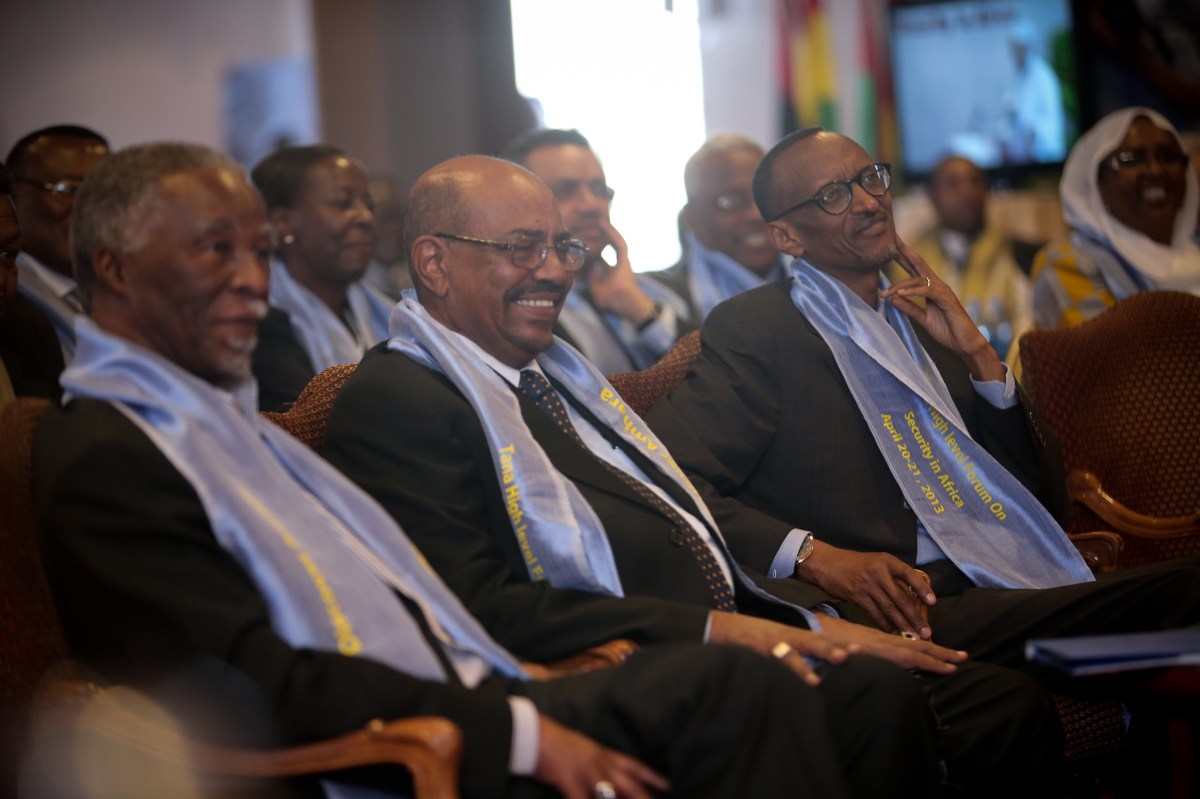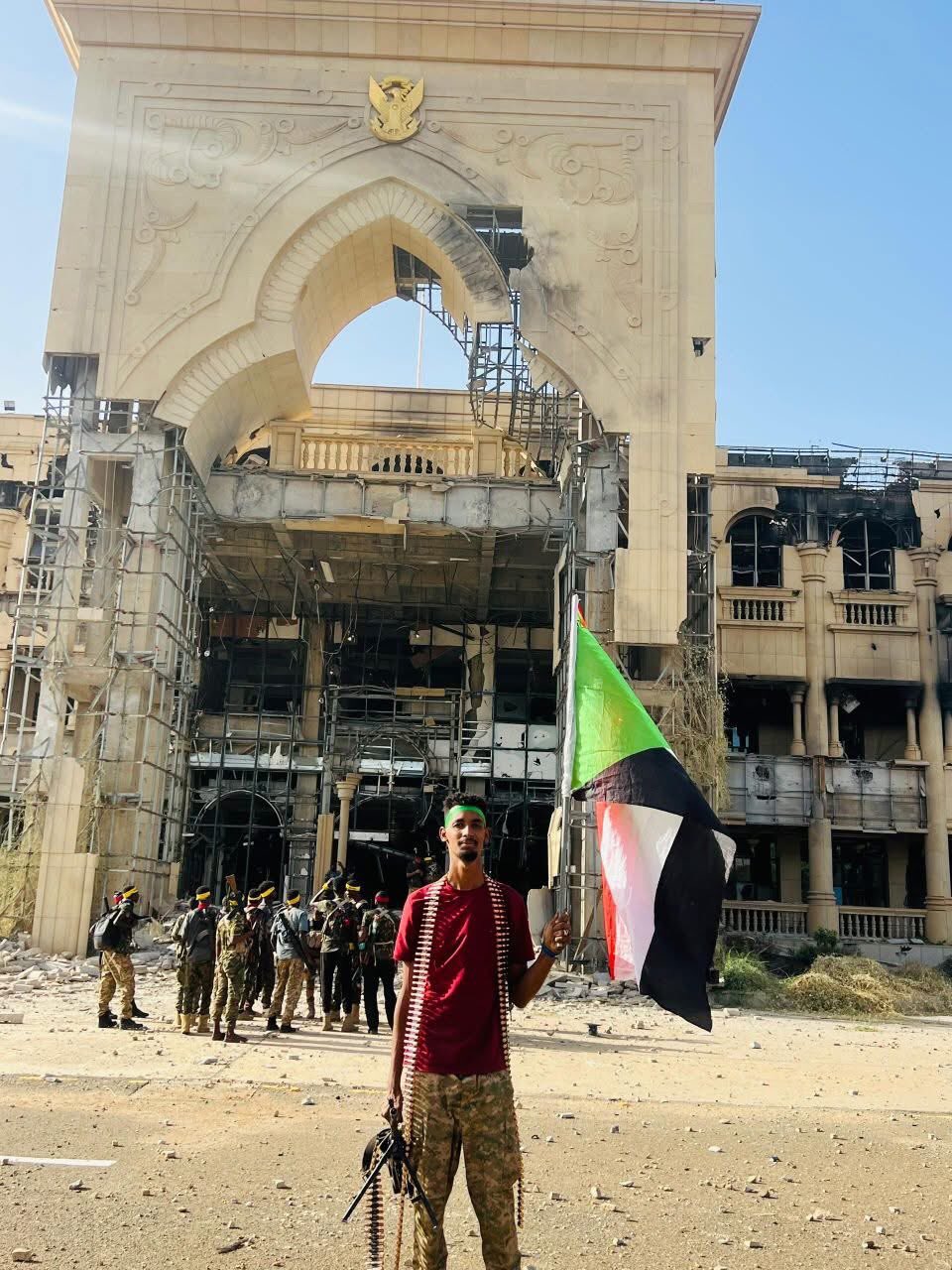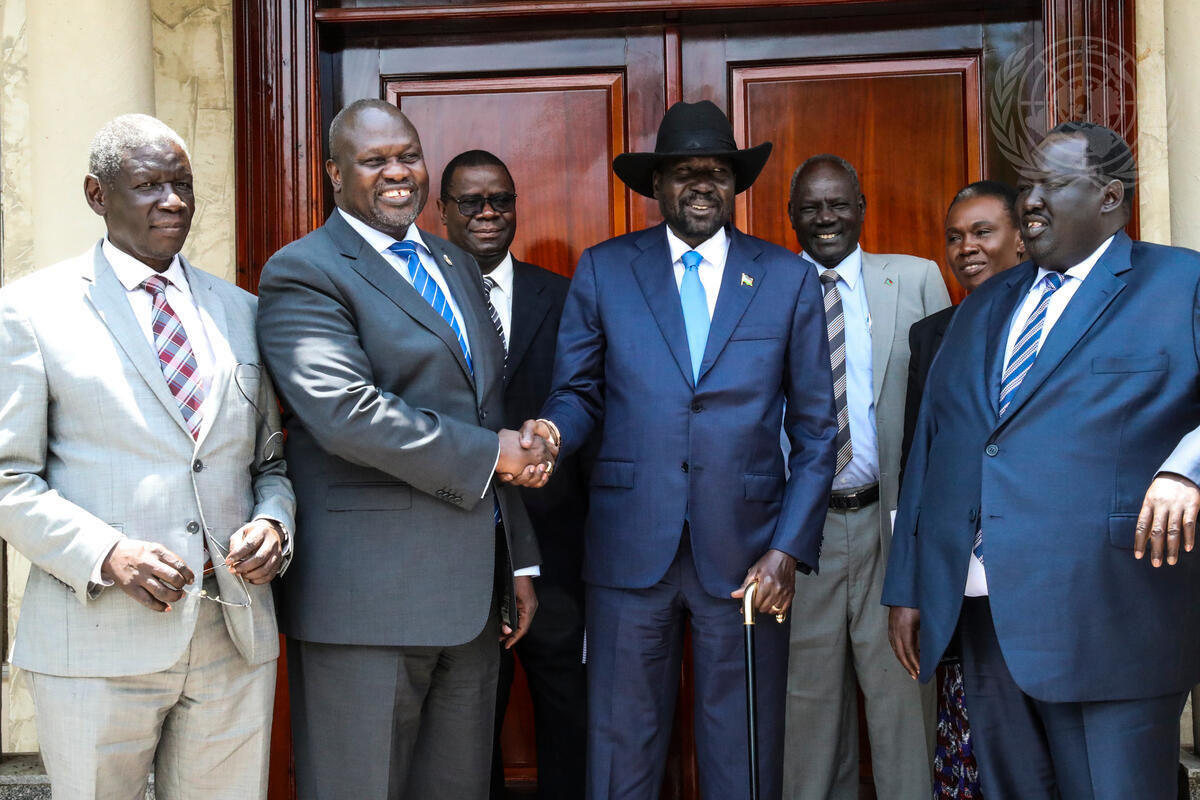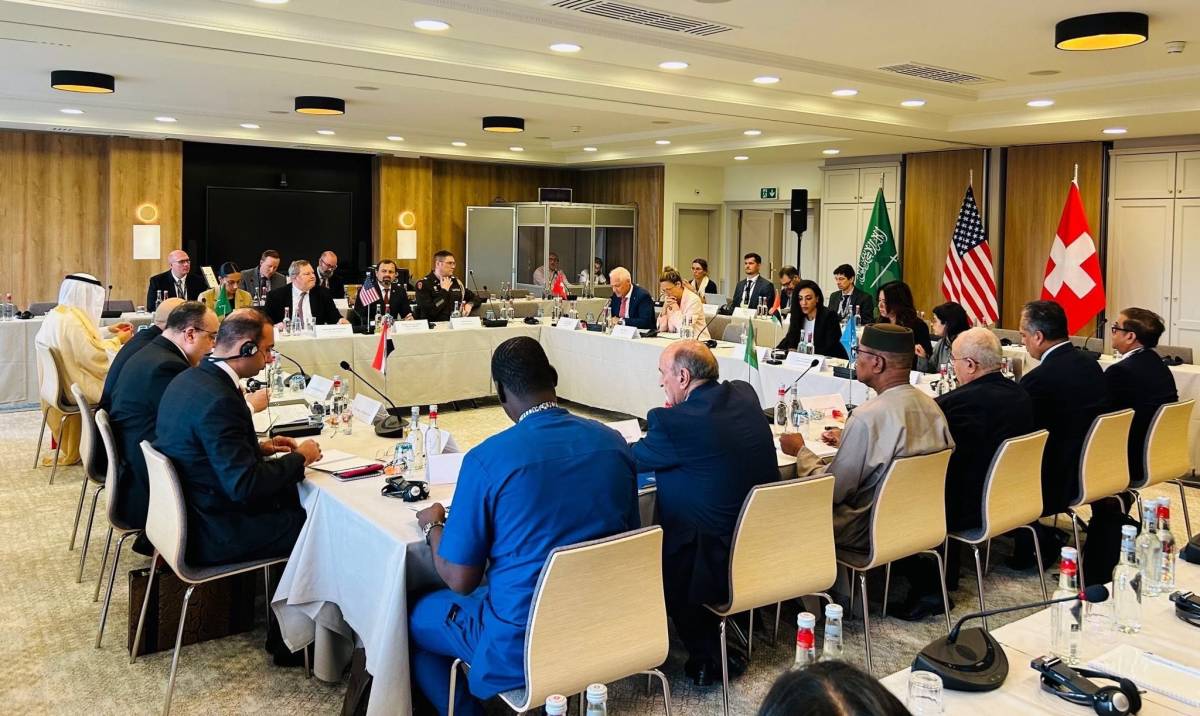Internationale Politik 1/2025, erschienen am 30.12.2024.
(Photo: US Sondergesandter Tom Periello trifft SAF Führer Abdelfattah al-Burhan, Port Sudan, 18.12.2024)
Nirgends sind mehr Menschen vertrieben (über 14 Millionen), nirgends leiden mehr Menschen Hunger (über 25 Millionen) als im Sudan. Im Land herrscht die größte humanitäre Krise weltweit. Nur etwa jedes zehnte Kind hier hat seit Kriegsbeginn eine Schule besucht, rund zwei Drittel der Bevölkerung haben keinen Zugang zu medizinischen Einrichtungen. Sexuelle Gewalt wird als Waffe eingesetzt, und das so systematisch und brutal, dass einige Frauen eher Suizid begehen, als sich ihr auszuliefern.
Am 15. April 2023 begann der Krieg in der Hauptstadt Khartum und weitete sich noch am selben Tag auf andere Landesteile aus. Lange schwelende Spannungen zwischen der regulären Armee, den Sudanese Armed Forces (SAF), und den paramilitärischen Rapid Support Forces (RSF) eskalierten. Eigentlich hatten beide Parteien zugesagt, nach einem gemeinsamen Putsch im Oktober 2021 die Macht an eine zivile Regierung abzugeben. Doch sie konnten sich nicht darauf einigen, wie ihr künftiges Verhältnis aussehen und in welchem Tempo die RSF integriert werden sollten. Nun offenbaren sich im Krieg die tiefen Gräben innerhalb des Landes.
Wettbewerb der Vermittler
Internationale Bemühungen, den Krieg zu beenden, begannen kurz nach Ausbruch der Kämpfe. Es entwickelte sich geradezu ein Wettbewerb zwischen den Initiativen unterschiedlicher Vermittler. Doch keine von ihnen brachte substanzielle Ergebnisse.
Der Krieg spiegelt damit auch eine Krise der bestehenden Mediationsansätze wider und zeigt die Dysfunktionalität multilateraler Formate. Aus deutscher Perspektive ist das insofern besonders bedauernswert, als die Bundesregierung traditionell darauf setzt, internationale Organisationen zu unterstützen, die ein Mandat zur Konfliktbearbeitung haben, statt sich selbst in den Vordergrund zu spielen.
Weder die Initiativen von Institutionen wie den Vereinten Nationen, der Afrikanischen Union oder der regionalen Intergovernmental Authority on Development noch die der USA, Saudi-Arabiens und anderer Staaten waren im Sudan bislang von Erfolg gekrönt.
Natürlich hat das viel mit der verfahrenen Situation im Land zu tun. Es ist aber auch darauf zurückzuführen, dass alle diese Initiativen immer wieder unter ihren Möglichkeiten geblieben sind; weil sie den Konflikt nicht tiefgehend genug analysierten, weil sie sich Illusionen über die Möglichkeit eines Verhandlungsdeals machten oder weil sie einseitig agierten. Hinzu kommt, dass die internationalen Organisationen durch geopolitische Spannungen geschwächt sind und – auch das ist ein Teil der Wahrheit – oft eine außerordentliche Trägheit an den Tag legen.
Für eine politische Vermittlung auf Ebene der Vereinten Nationen blieb nach dem Ende der politischen Mission UNITAMS im Februar 2024 nur noch der persönliche Sondergesandte des UN-Generalsekretärs für den Sudan, Ramtane Lamamra. Dieser übt sein Mandat in Teilzeit aus, verfügt über einen nur sehr kleinen Mitarbeiterstab und hat kaum Mittel für eigene programmatische Aktivitäten.
António Guterres legte Ende Oktober 2024 dem UN-Sicherheitsrat einen Bericht mit Empfehlungen zum Schutz der Zivilbevölkerung im Sudan vor. Diese waren jedoch sehr zurückhaltend formuliert. Ein eher SAF-freundlicher Resolutionsentwurf von Großbritannien und Sierra Leone zum Thema scheiterte im November 2024 an einem Veto Russlands; vermutlich, weil Moskau London wegen dessen Unterstützung der Ukraine Steine in den Weg legen wollte.
Die Afrikanische Union (AU) ihrerseits schaffte es vergleichsweise schnell, eine Kontaktgruppe für den Sudan zu bilden, berief diese allerdings nur unregelmäßig ein. Die SAF lehnt die AU ohnehin als Vermittlerin ab, solange der Sudan wegen des Putsches vom Oktober 2021 suspendiert bleibt. Folglich wollte sich die AU darauf konzentrieren, einen politischen Prozess mit Vertretern der Zivilgesellschaft zu organisieren. Doch auch hier gab es jede Menge Verzögerungen. Die AU ernannte zwar eine hochrangige Vermittlungsgruppe. Nach zwei Vorbereitungstreffen mit unterschiedlichen sudanesischen Gruppen im Juli und August 2024 wurde die geplante Konferenz jedoch immer wieder verschoben, zur großen Frustration der beteiligten politischen Parteien.
Bleibt noch die Intergovernmental Authority on Development (IGAD). Vor rund zehn Jahren hatte sie eine Führungsrolle bei den Friedensverhandlungen im Südsudan gespielt; jetzt aber kam sie auch nicht recht voran. Die Organisation der Staaten am Horn von Afrika ernannte ein Verhandlungsquartett unter Führung Kenias (mit Äthiopien, Dschibuti und dem Südsudan) sowie einen Sondergesandten für den Sudan.
Ihr Vorschlag, ein persönliches Treffen zwischen SAF-Führer Abdelfattah al-Burhan und RSF-Führer Mohamed Hamdan Dagalo, genannt Hemedti, zu arrangieren, scheiterte jedoch an der Weigerung Burhans. Als sich die IGAD-Staatschefs schließlich nur mit Hemedti im Januar 2024 in Kampala trafen, nahmen die SAF das zum Anlass, die Mitgliedschaft des Sudan auszusetzen.
Ausbeutung und Autokratie
Sudanesische Gesprächspartner betonen immer wieder, dass jede Anstrengung, den Krieg zu beenden, die historische Krise des Staates im Sudan als Ausgangspunkt nehmen muss. Doch genau an so einer gemeinsamen Problemdefinition fehlt es vielen der internationalen Vermittler.
Sowohl die IGAD als auch die AU bemühten sich explizit um ein persönliches Treffen von Burhan und Hemedti. Die Idee, es handele sich im Sudan um einen bloßen Machtkampf zweier Generäle, ist jedoch so irreführend wie zu kurz gegriffen. SAF und RSF bilden vielmehr die Spitzen von Koalitionen bewaffneter Kämpfer, über die sie keine vollständige Kontrolle haben.
Burhan erklärte im Mai 2024, dass drei Viertel der Kämpfer auf Seiten der Armee Freiwilligenverbände seien. Diese stehen oft unter dem Einfluss der Netzwerke des früheren Bashir-Regimes und agieren halbautonom. Hinzu kommen diverse bewaffnete Gruppen sowie zahlreiche ausländische Söldner auf beiden Seiten. Sollte Burhan einen Waffenstillstand unterschreiben, könnte er schnell von einem seiner Konkurrenten innerhalb der Armee entmachtet werden.
13 Jahre zivile Herrschaft
Seinem Wesen nach ist der Konflikt ohnehin ganz grundsätzlicher Natur: Es geht um die Frage, wie Staat und Gesellschaft sich zueinander verhalten sollen. Der Sudan ist seit Langem geprägt von der Ausbeutung der Peripherie durch Eliten im Zentrum des Landes. Die Geschicke des Landes werden im Sicherheitssektor entschieden – mit drei kurzen Ausnahmen seit 1958: 1964, 1985 und 2019 sorgten Volksaufstände, gepaart mit einer Unzufriedenheit von Teilen des Regierungsapparats, für insgesamt 13 Jahre mehr oder weniger ziviler Herrschaft. Der Klimawandel verstärkte den Zulauf zu bewaffneten Aufständischen, weil weite Flächen, die vorher für Ackerbau oder nomadische Viehzucht genutzt wurden, in den vergangenen 40 Jahren brach fielen, insbesondere in Darfur.
Um Aufstände zu bekämpfen, setzte die sudanesische Regierung auf die Rekrutierung, Ausbildung und Bewaffnung von oft ethnisch definierten Milizen. Präsident Omar al-Bashir, der 1989 mittels eines Putsches an die Spitze einer islamistisch-militärischen Regierung gelangte, versuchte immer wieder, Rebellionen zu spalten, indem er abtrünnige Führer und deren Gruppen unterstützte, ob im Süden oder in Darfur. Aus einer Gruppe der Dschandschawid-Milizen aus Darfur entstanden schließlich die Rapid Support Forces.
Der heutige Machtkampf ist das Produkt dieses Musters von Ausbeutung, Aufstandsbekämpfung, Militarisierung und autokratischer Herrschaftssicherung. Gleichzeitig treibt der Krieg die Fragmentierung des Landes weiter voran. Es entstehen neue bewaffnete Gruppierungen, die den Krieg als Gelegenheit sehen, historisches Unrecht zu begleichen oder sich zu bereichern.
Viele Gespräche, wenig Ertrag
Neben den multilateralen Initiativen gab es von Saudi-Arabien und den USA organisierte Gespräche mit den SAF und den RSF im saudischen Dschidda im Mai und im November 2023. Im Januar 2024 fanden zudem hochrangige Gespräche zwischen SAF und RSF in Bahrain statt, und im August 2024 luden die USA zu Waffenstillstandsgesprächen in die Schweiz ein.
Unterschrieben SAF und RSF in der ersten Runde in Dschidda noch eine – nie umgesetzte – gemeinsame Erklärung zum Schutz der Zivilbevölkerung, so wurde es danach immer schwieriger, die beiden Parteien dazu zu bekommen, gemeinsame Erklärungen zu unterzeichnen oder überhaupt an einen Tisch zu kommen. Diese Initiativen konzentrierten sich auch deshalb auf die Kriegsparteien RSF und SAF, weil die USA und andere Vermittler dringend Ergebnisse erreichen wollten. Es war klar, dass es viel Geduld und Zeit brauchen würde, bis lokale Friedensbemühungen Früchte tragen würden oder bis eine gemeinsame zivile Plattform etabliert wäre, die eine glaubwürdige Alternative zur Gewalt bieten könnte.
Weder RSF noch SAF lassen derzeit eine ernsthafte Bereitschaft erkennen,
Waffenstillstandsgespräche zu führen
Doch das Ausmaß der humanitären Krise, das Nachlassen der politischen Aufmerksamkeit und die Suche nach einem schnellen Erfolg gerade mit Blick auf die ablaufende Amtszeit der US-Regierung sorgten dafür, dass die Vermittler eher kurzsichtige Ansätze verfolgten. Weder RSF noch SAF lassen derzeit eine ernsthafte Bereitschaft erkennen, Waffenstillstandsgespräche zu führen. Die RSF stellen sich dabei gern als Kraft dar, die an den bisherigen Initiativen konstruktiv mitgewirkt habe, während die Gegenseite sich entweder zurückgezogen habe oder gar nicht erst erschienen sei. Da ist zweifelsohne etwas dran – doch ist auch auffällig, dass es bereits mehrfach zu einem Anstieg von Gräueltaten der RSF im Sudan kam, während ihre Verhandlungsdelegationen gerade in Konferenzräumen saßen. Die Eroberungsfeldzüge der RSF strafen ihre Rhetorik, sie würden sich nur verteidigen, Lügen.
Solange sich eine in dieser Hinsicht unglaubwürdige Konfliktpartei wie die RSF für Frieden und Demokratie einsetzt, untergräbt das die Konzepte selbst. Sich für Frieden einzusetzen, gilt bei vielen Sudanesen mittlerweile als Pro-RSF-Position. Ein verhandeltes Abkommen, das die RSF zunächst weiter bestehen ließe, wird auch über die Kreise der SAF und ihrer islamistischen Verbündeten hinaus abgelehnt.
Die meisten Mediationsformate legitimieren notwendigerweise diejenigen, die ihre Ziele mit Gewalt erreichen wollen. Positionen, die im zivilen politischen Betrieb nicht durchsetzbar waren, werden dort zur Verhandlungsmasse. Doch die Rücksichtnahme auf die Interessen der Sicherheitskräfte ist ja gerade eine zentrale Ursache für die Eskalation der Gewalt im Sudan.
Vertreter der sudanesischen Zivilgesellschaft und einige der beteiligten Diplomaten kritisierten im Nachhinein, dass es nach Etablierung der Übergangsregierung 2019 und nach dem Putsch zwei Jahre später nicht genügend Druck auf die Sicherheitskräfte gegeben habe. So strichen internationale Geber nach dem Putsch zwar einige Gelder, konnten sich aber kaum auf gezielte Sanktionen gegen die Generäle einigen, die auf die Zehntausenden von Demonstranten schießen ließen.
Problematische Parteinahme
Mittlerweile gewinnen die regulären Sudanese Armed Forces auch international an Akzeptanz. Schließlich kontrollieren diese die Ministerien, die sich in den ersten Kriegsmonaten nach Port Sudan am Roten Meer zurückgezogen hatten. Die Rapid Support Forces machen ihrerseits vor allem mit ihrer brutalen Gewalt auf sich aufmerksam. Nicht nur viele afrikanische Staaten, auch die Vereinten Nationen betrachten die SAF-kontrollierten Ministerien als offizielle Vertretung des Sudan.
Umgekehrt bleibt das Land seit dem Putsch von 2021 aus der Afrikanischen Union ausgeschlossen. Zwar gibt es mittlerweile in mehreren von den RSF kontrollierten Bundesstaaten Regierungen, doch existiert derzeit keine alternative Regierung auf nationaler Ebene, die internationale Anerkennung finden könnte. Aus moralischen, völkerrechtlichen oder geopolitischen Motiven scheint der Gedanke nahe zu liegen, die RSF zu verdammen und gleichzeitig den Rest von Staatlichkeit in Port Sudan zu stärken.
Die Armee ist in den
30 Jahren unter
Präsident Bashir ebenso
systematisch von der
Islamischen Bewegung ausgehöhlt worden wie der übrige Staatsapparat
Das wäre jedoch ein Trugschluss. Schlimmer noch: Eine solche Parteinahme würde die Chancen auf eine friedliche Beilegung des Krieges weiter schmälern. Denn bei genauerem Hinsehen teilen die Armee und die Paramilitärs gewisse Ähnlichkeiten. Die RSF sind nicht als Rebellengruppe entstanden, sondern waren zu Beginn des Krieges eine reguläre Sicherheitskraft. Hemedti selbst war seit 2019 Stellvertreter Burhans im Souveränitätsrat und trat quasi als Vizepräsident auf.
Die Armee ist in den 30 Jahren unter Präsident Bashir ebenso systematisch von der Sudanesischen Islamischen Bewegung ausgehöhlt worden wie der übrige Staatsapparat. Sie repräsentiert in ihrer Führung keineswegs die Vielfalt des Landes. Es mag sein, dass die RSF für deutlich mehr Gewalt gegen die Zivilbevölkerung verantwortlich sind. Doch die SAF bombardieren ebenfalls Märkte, Krankenhäuser und Wohngebiete, verüben Massaker und verhaften auf der Grundlage eines rassistischen Gesetzes systematisch Menschen, deren Aussehen oder Namen auf eine Verbindung zu arabischen Gruppen im Westen schließen lässt. Und während die RSF von Waffenlieferungen aus den Vereinigten Arabischen Emiraten profitieren, paktiert die Armee mit Ägypten, dem Iran und Russland.
Legitimität ist zudem ein zentrales Druckmittel für Verhandlungen, das man nicht leichtfertig aus der Hand geben sollte. Noch in Dschidda hatten RSF und SAF es akzeptiert, als reine Militärs zu verhandeln. In der Schweiz im August 2024 hätten die SAF als Regierung des Sudan auftreten wollen und hatten unter anderem deshalb keine Delegation geschickt, weil sie das nicht durften. Bei seinem Besuch in Port Sudan im November bezeichnete der US-Sondergesandte Tom Perriello jedoch Burhan als Präsidenten des Souveränitätsrats und hob ihn damit auf eine höhere Stufe als die RSF. Der UN-Sicherheitsrat übernahm diese Formel.
Was zu tun wäre
Damit zukünftige Vermittlungen für ein Ende der Gewalt im Sudan erfolgreicher verlaufen können, sollten alle Beteiligten ihre Lehren aus den bisherigen Erfahrungen ziehen. Wenn wir uns das Ausmaß der Vertreibung, Polarisierung und bewussten Instrumentalisierung des sozialen Gefüges anschauen, dann deutet alles darauf hin, dass der Krieg noch Jahre andauern wird. Ein militärischer Sieg einer Seite ist nicht abzusehen. Die implizite oder explizite Anerkennung gegenseitiger Einflusssphären erscheint wahrscheinlicher, während bewaffnete Auseinandersetzungen vor allem im Zentrum und Süden des Landes anhalten könnten. Wer nur mit SAF und RSF verhandelt, wird jedoch keinen stabilen Frieden erreichen.
Frauen und junge Menschen, die Treiber der
Proteste seit 2018, können wichtige Kräfte
der Veränderung sein
Entscheidend wird es sein, jegliches Friedensengagement langfristig, strukturiert und differenziert anzulegen. Dafür sollten Vertreter der sudanesischen Politik und der Zivilgesellschaft die Führung übernehmen und international unterstützt werden. Die Förderer und Vermittler sollten die vielfältige und stark polarisierte zivile Szene dabei nicht unter Druck setzen, sich auf eine einzige Plattform zu einigen. Die „Taqaddum“ genannte Koalition unter Vorsitz des ehemaligen Premierministers Abdalla Hamdok etwa genießt nur wenig Vertrauen in der Bevölkerung.
Wichtig wäre es, lokale Initiativen für den Schutz ziviler Infrastruktur oder einzelner Orte zu unterstützen. Frauen und junge Menschen, die Treiber der Proteste seit Dezember 2018, sollten nicht als bloße optionale Zusätze zu Verhandlungen gesehen werden, sondern als wichtige Kräfte der Veränderung. So retten Freiwilligennetzwerke gerade dort viele Leben, wo internationale Hilfe nicht hingelangt. Mit ihren Suppenküchen und Versorgungsangeboten tragen sie auch zum sozialen Zusammenhalt bei.
Darüber hinaus sollten die Bundesregierung und ihre europäischen Partner die externen Unterstützer der Konfliktparteien stärker unter Druck setzen und genauer bei einigen Themen hinschauen, die (auch) den Sudan betreffen. So sollten sie sich dafür einsetzen, den Goldhandel aus kleinen Minen stärker zu regulieren, internationale Geldwäschestandards strenger anzuwenden und den Endverbleib von Militärgüterlieferungen penibler zu kontrollieren. Des Weiteren sollten die Einhaltung von Menschenrechtsstandards bei europäischen Migrationspartnerländern wie Ägypten und Tunesien strenger angemahnt werden und mehr Staaten und Personen auf die europäischen Sanktionslisten gesetzt werden.
Im Krieg im Sudan sollten die Europäer sich nur auf eine Seite stellen: auf die der mutigen Frauen und Männer, die weiterhin mit gewaltfreien Mitteln eine lebenswerte Zukunft schaffen wollen.






